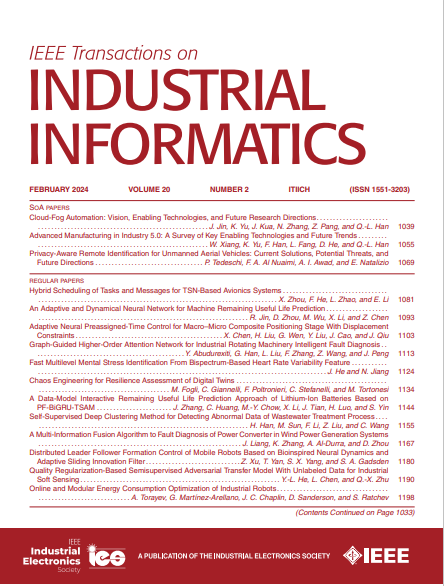A Distributed Semi-Consensus-Based Data-Driven Fault Detection Approach for Dynamic Systems
IF 9.9
1区 计算机科学
Q1 AUTOMATION & CONTROL SYSTEMS
引用次数: 0
Abstract
In this article, a distributed semi-consensus-based data-driven fault detection scheme is developed based on the process variables collected by sensor networks to ensure the safety of the large-scale dynamic processes. For our purpose, the distributed data-driven process modeling scheme is developed for dynamic systems first by considering the communication topology of the sensor networks. Then, a distributed Kalman filter-based fault detection approach is developed aiming at achieving optimal detection performance at each sensor node. Specifically, the distributed iterative learning algorithm is implemented to calculate the needed parameter matrices for Kalman filter-based residual generator offline with the aid of average consensus algorithm. It is followed by a distributed fusion of local residual signals to perform online optimal fault detection. To avoid the detection delay caused by the traditional average consensus method, the semi-consensus algorithm is developed for the first time to ensure the timely detection of potential faults. A case study on the multiphase flow facility process is given in the end to demonstrate the proposed method.基于分布式半共识的动态系统数据驱动故障检测方法
本文基于传感器网络采集的过程变量,提出了一种基于分布式半共识的数据驱动故障检测方案,以保证大规模动态过程的安全。为此,首先考虑传感器网络的通信拓扑结构,提出了动态系统的分布式数据驱动过程建模方案。然后,提出了一种基于分布式卡尔曼滤波的故障检测方法,以实现各传感器节点的最优检测性能。具体而言,采用分布式迭代学习算法,借助于平均一致性算法离线计算基于卡尔曼滤波的残差发生器所需的参数矩阵。然后对局部残差信号进行分布式融合,实现在线最优故障检测。为了避免传统平均一致性方法造成的检测延迟,首次提出了半一致性算法,以保证对潜在故障的及时检测。最后以多相流装置过程为例,对所提出的方法进行了验证。
本文章由计算机程序翻译,如有差异,请以英文原文为准。
求助全文
约1分钟内获得全文
求助全文
来源期刊

IEEE Transactions on Industrial Informatics
工程技术-工程:工业
CiteScore
24.10
自引率
8.90%
发文量
1202
审稿时长
5.1 months
期刊介绍:
The IEEE Transactions on Industrial Informatics is a multidisciplinary journal dedicated to publishing technical papers that connect theory with practical applications of informatics in industrial settings. It focuses on the utilization of information in intelligent, distributed, and agile industrial automation and control systems. The scope includes topics such as knowledge-based and AI-enhanced automation, intelligent computer control systems, flexible and collaborative manufacturing, industrial informatics in software-defined vehicles and robotics, computer vision, industrial cyber-physical and industrial IoT systems, real-time and networked embedded systems, security in industrial processes, industrial communications, systems interoperability, and human-machine interaction.
 求助内容:
求助内容: 应助结果提醒方式:
应助结果提醒方式:


